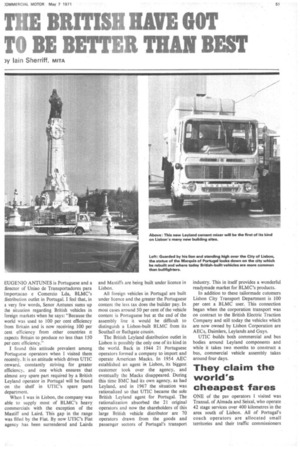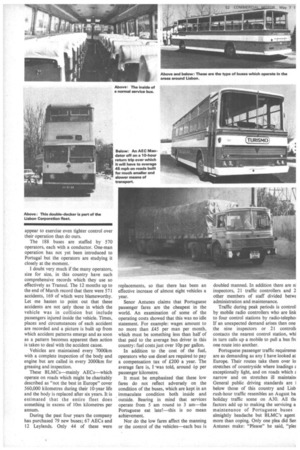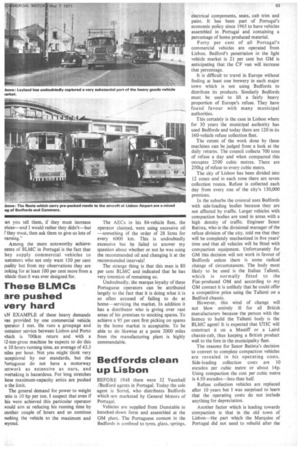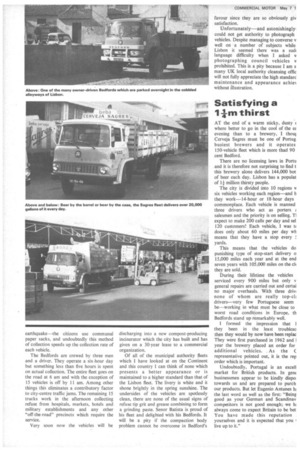THE BRITISH HAVE GOT TO BE BETTER THAN BEST
Page 53

Page 54

Page 55

Page 56

If you've noticed an error in this article please click here to report it so we can fix it.
lain Sherriff, MITA
EUGENIO ANTUNES is Portuguese and a director of Uniao de Transportadores para Importacao e Comercio Lda, BLMC's distribution outlet in Portugal. I feel that, in a very few words, Senor Antunes sums up the situation regarding British vehicles in foreign markets when he says: "Because the world was used to 100 per cent efficiency from Britain and is now receiving 100 per cent efficiency from other countries it expects Britain to produce no less than 150 per cent efficiency."
I found this attitude prevalent among Portuguese operators when I visited them recently. It is an attitude which drives UTIC onward, constantly striving for greater efficiency, and one which ensures that almost any spare part required by a British Leyland operator in Portugal will be found on the shelf in UTIC's spare parts department.
When I was in Lisbon, the company was able to supply most of BLMC's heavy commercials with the exception of the Mastiff and Laird. This gap in the range was filled by the Fiat. By now UTIC's Fiat agency has been surrendered and Lairds and Mastiffs are being built under licence in Lisbon.
All foreign vehicles in Portugal are built under licence and the greater the Portuguese content the less tax does the builder pay. In most cases around 50 per cent of the vehicle content is Portuguese but at the end of the assembly line it would be difficult to distinguish a Lisbon-built BLMC from its Southall or Bathgate cousin.
The British Leyland distribution outlet in Lisbon is possibly the only one of its kind in the world. Back in 1944 21 Portuguese operators formed a company to import and operate American Macks. In 1954 AEC established an agent in_ Lisbon, its biggest customer took over the agency, and eventually the Macks disappeared. During this time BMC had its own agency, as had Leyland, and in 1967 the situation was rationalized so that UTIC became the sole British Leyland agent for Portugal. The rationalization absorbed the 21 original operators and now the shareholders of this large British vehicle distributor are 70 operators drawn from the goods and passenger sectors of Portugal's transport industry. This in itself provides a wonderful readymade market for BLMC's products.
In addition to these tailormade cutomers Lisbon City Transport Department is 100 per cent a BLMC user. This connection began when the corporation transport was on contract to the British Electric Traction Company and still today the vehicles which are now owned by Lisbon Corporation are AECs, Daimlers, Leylands and Guys.
UTIC builds both commercial and bus bodies around Leyland components and while it takes two months to construct a bus, commercial vehicle assembly takes around four days.
They claim the world's cheapest fares
ONE of the psv operators I visited was Transul, of Almada and Seixal, who operate 42 stage services over 400 kilometres in the area south of Lisbon. All of Portugal's coach operators are allocated small territories and their traffic commissioners appear to exercise even tighter control over their operation than do ours.
The 188 buses are staffed by 570 operators, each with a conductor. One-man operation has not yet been introduced to Portugal but the operators are studying it closely at the moment.
I doubt very much if the many operators, size for size, in this country have such comprehensive records which they use so effectively as Transul. The 12 months up to the end of March record that there were 571 accidents, 169 of which were blameworthy. Let me hasten to point out that these accidents are not Qnly those in which the vehicle was in collision but include passengers injured inside the vehicle. Times, places and circumstances of each accident are recorded and a picture is built up from which accident patterns emerge and as soon as a pattern becomes apparent then action is taken to deal with the accident cause.
Vehicles are maintained every 7000km with a complete inspection of the body and engine but are called in every 2000km for greasing and inspection.
These BLMCs—mainly AECs—which operate on roads which might be charitably described as "not the best in Europe" cover 560,000 kilometres during their 10-year life and the body is replaced after six years. It is estimated that the entire fleet does something in excess of 10m kilometres per annum.
During the past four years the company has purchased 79 new buses; 67 AECs and 12 Leyiands. Only 44 of these were replacements, so that there has been an effective increase of almost eight vehicles a year.
Senor Antunes claims that Portuguese passenger fares are the cheapest in the world. An examination of some of the operating costs showed that this was no idle statement. For example: wages amount to no more than £45 per man per month, which must be something less than half of that paid to the average bus driver in this country: fuel costs just over 10p per gallon.
In addition to the cost of the fuel, operators who use diesel are required to pay a compensation tax of £200 a year. The average fare is, I was told, around 4-,p per passenger kilometre.
It must be emphasized that these low fares do not reflect adversely on the condition of the buses, which are kept in an immaculate condition both inside and outside. Bearing in mind that services operate from 5 am round to 3 am—tho Portuguese eat late—this is no mean achievement.
Nor do the low fares affect the manning or the control of the vehicles—each bus is doubled manned. In addition there are ni inspectors, 21 traffic controllers and 2 other members of staff divided betwe administration and maintenance.
Traffic during peak periods is control] by mobile radio controllers who are link to four control stations by radio-telephol If an unexpected demand arises then one the nine inspectors or 21 contralti contacts the nearest control station, whi in turn calls up a mobile to pull a bus frc one route into another.
Portuguese passenger traffic requiremei are as demanding as any I have looked at Europe. Their routes take them over lo stretches of countryside where loadings z exceptionally light, and on roads which narrow and on stretches ill maintaini General public driving standards are i below those of this country and Lisb rush-hour traffic resembles an August ha holiday traffic scene on A30. All ttu factors add up to making the servicing a maintenance of Portuguese buses almightly headache but BLMC's agent more than coping. Only one plea did Sen Antunes make: "Please" he said, "ple2 an you tell them, if they milk increase )riees—and I would rather they didn't—but I' they must, then ask them to give us lots of yarning."
Among the more noteworthy achievenents of BLMC in Portugal is the fact that hey supply commercial vehicles to :ustomers who not only want 150 per cent mality but from my observations they are coking for at least 100 per cent more from a Thiele than it was ever designed for.
These BLMCs are pushed very hard
01 EXAMPLE of these heavy demands vas provided by one commercial vehiCle perator I met. He runs a groupage and :ontainer service between Lisbon and Porto vhich is 700km return and with a 12-ton-gross machine he expects to do'this
n 10 hours running time, an average of 43.5 niles per hour. Not you might think very aceptional by our standards, but the ?ortuguese do not have a motorway letwork as extensive as ours, and 'vet-taking is hazardous. For long stretches hese maximum-capacity artics are pushed
o the limit.
The general demand for power to weight Patio is 10 hp per ton. I suspect that even if his were achieved this particular operator would aim at reducing his running time by mother couple of hours and so continue rushing the vehicle to the maximum and seyond. The AECs in his 84-vehicle fleet, the operator claimed, were using excessive oil —something of the order of 28 litres for every 6000 km. This is undoubtedly excessive but he failed to answer my question about whether or not he was using the recommended oil and changing it at the recommended intervals!
The strange thing is that this man is 80 per cent BLMC and indicated that he has very intention of remaining so.
Undoubtedly, the marque loyalty of these Portuguese operators can be attributed largely to the fact that it is doing what it is so often accused of failing to do at home—servicing the market. In addition it has a distributor who is giving over vast areas of his premises to stocking spares. To achieve a 95 per cent first picking on spares in the home market is acceptable. To be able to do likewise at a point 2000 miles from the manufacturing plant is highly commendable.
Bedfords clean up Lisbon
BEFORE 1948 there were 32 Vauxhall /Bedford agents in Portugal. Today the sole agent is Sorrel, who distributes Bedfords which are marketed by General Motors of Portugal.
Vehicles are supplied from Dunstable in knocked-down form and assembled at the GM plant. The Portuguese content in the Bedfords is confined to tyres, glass, springs, electrical components, seats, cab trim and paint. It has been part of Portugal's economic policy since 1965 to have vehicles assembled in Portugal and containing a percentage of home produced material.
Forty per cent of all Portugal's commercial vehicles are operated from Lisbon. Bedford's penetration in the light vehicle market is 21 per cent but GM is anticipating that the CF van will increase that percentage.
It is difficult to travel in Europe without finding at least one brewery in each major town which is not using Bedfords to distribute its products. Similarly Bedfords must be used to lift a fairly heavy proportion of Europe's refuse. They have found favour with many municipal authorities.
This certainly is the case in Lisbon where for 30 years the municipal authority has used Bedfords and today there are 120 in its 160-vehicle refuse collection fleet.
The extent of the work done by these machines can be judged from a look at the daily returns. The council collects 700 tons of refuse a day and when compacted this occupies 2500 cubic metres. There are 250kg of refuse to every cubic metre.
The city of Lisbon has been divided into 12 zones and in each zone there are seven collection routes. Refuse is collected each day from every one of the city's 130,000 premises.
In the suburbs the council! uses Bedfords with side-loading bodies because they are not affected by traffic. Larger vehicles with compaction bodies are used in areas with a high density of traffic. Engineer Senor Batista, who is the divisional manager of the refuse division of the city, told me that they will be completely mechanized in five years' time and that all vehicles will be fitted with cornpaction equipment. Unfortunately for GM this decision will not work in favour of Bedfords unless there is some radical change of circumstances. The body most likely to be used is the Italian Tallenti, which is normally fitted to the Fiat-produced OM and according to my GM contact it is unlikely that he could offer a competitive price using the Tallenti on a Bedford chassis.
However, this wind of change will not blow entirely ill for all British manufacturers because the person with the licence to build the Tallenti body is the BLMC agent! It is expected that UTIC will construct it on a Mastiff or a Laird chassis-cab, thus keeping a British product well to the fore in the municipality fleet.
The reasons for Senor Batista's decision to convert to complete compaction vehicles are revealed in his operating costs. Side-loading collection costs are 10 escudos per cubic metre or about 14p. Using compaction the cost per cubic metre is 4.50 escudos—less than half.
Refuse collection vehicles are replaced after 10 years but I was surprised to learn that the operating costs do not include anything for depreciation.
Another factor which is leading towards compaction is that in the old town of Lisbon—the part which the Marquise of Portugal did not need to rebuild after the earthquake—the citizens use communal paper sacks, and undoubtedly this method of collection speeds up the collection rate of each vehicle.
The Bedfords are crewed by three men and a driver. They operate a six-hour day but something less than five hours is spent on actual collection. The entire fleet goes on the road at 6 am and with the exception of 15 vehicles is off by 11 am. Among other things this eliminates a contributory factor to city-centre traffic' jams. The remaining 15 trucks work in the afternoon collecting refuse from hospitals, markets, hotels and military establishments and any other "off-the-road" precincts which require the service.
Very soon now the vehicles will be discharging into a new compost-producing incinerator which the city has built and has given on a 30-year lease to a commercial organization.
Of all of the municipal authority fleets which I have looked at on the Continent and this country I can think of none which presents a better appearance or is maintained to a higher standard than that of the Lisbon fleet. The livery is white and it shone brightly in the spring sunshine. The undersides of the vehicles are spotlessly clean, there are none of the usual signs of refuse tip grit and grease combining to form a grinding paste. Senor Batista is proud of his fleet and delighted with his Bedfords. It will be a pity if the compaction body problem cannot be overcome in Bedford's favour since they are so obviously giv satisfaction.
Unfortunately—and astonishinglycould not get authority to photograph vehicles. Despite managing to converse v well on a number of subjects while Lisbon it seemed there was a midi language difficulty when I asked v photographing council vehicles v prohibited. This is a pity because I am s many UK local authority cleansing offic will not fully appreciate the high standarc maintenance and appearance achieN without illustration.
r-3 Satisfying a 1-1-rn thirst
AT the end of a warm sticky, dusty where better to go in the cool of the evening than to a brewery, I thoui Cerveja Sagres must be one of Portug busiest brewers and it operates 150-vehicle fleet which is more tharl 90 cent Bedford.
There are no licensing laws in Portu and it is therefore not surprising to find t this brewery alone delivers 144,000 bot of beer each day. Lisbon has a populat of lt million thirsty people.
The city is divided into 10 regions v six vehicles working each region—and tl they work-14-hour or 18-hour days commonplace. Each vehicle is manned three drivers who act as porters salesmen and the priority is on selling. T1 expect to make 200 calls per day and sel 120 customers! Each vehicle, I was ti does only about 60 miles per day wh means that they have a stop every yards.
This means that the vehicles do punishing type of stop-start delivery o 15,000 miles each year and at the end seven years with 105,000 miles on the ell they are sold.
During their lifetime the vehicles serviced every 900 miles but only v general repairs are carried out and certai no major overhauls. With three driv none of whom are really top-cli drivers—very few Portuguese seem be—working in what must be close to worst road conditions in Europe. th Bedfords stand up remarkably well.
I formed the impression that 1 they been in the least troublesc then they would by now have been replac They were first purchased in 1962 and] year the brewery placed an order for additional vehicles. As the C representative pointed out, it is the rep order which is important.
Undoubtedly, Portugal is an excel] market for British products. In gent businessmen appear to be kindly dispo towards us and are prepared to purch our products. But let Eugenio Antunes the last word as well as the first: "Being good As your German and Scandinav competitors is not good enough; we It always come to expect Britain to be bet You have made this reputation yourselves and it is expected that you live up to it."










































































































































































































